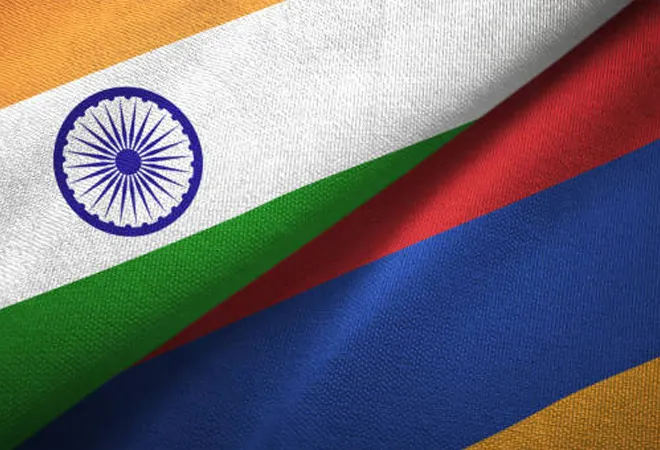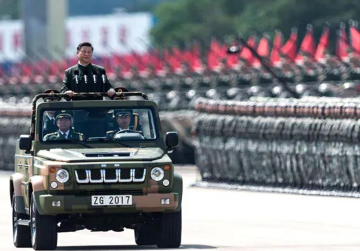
The recent US $155 million deal signed between Yerevan and a leading private Indian defence original equipment manufacturer, for the supply of 155 mm artillery systems to the former over the next three years, marks a continuation of New Delhi’s stated policy of
deepening defence cooperation with Armenia. The order closely follows a government-to-government deal with Yerevan to supply Armenian armed forces with PINAKA multi-barrel rocket launchers, anti-tank munitions, and wide-ranging ammunitions and warlike stores
worth US $250 million, which made Armenia New Delhi’s first international customer of the indigenously developed PINAKA system. Indeed, relations between Armenia and India have constituted a strategic priority for both nations, cemented by Indian Foreign Minister S. Jaishankar’s visit to Yerevan last year. Both democracies are ancient civilisations sharing historical linkages transcending culture and language, and it is in New Delhi’s interest to strengthen its partnership with Yerevan.
Supply chain and economy
Deeper collaboration with Armenia will benefit India economically. In the contest over global supply chains, Armenia provides a potential outpost for New Delhi in the Eurasian corridor which extends from the Persian Gulf to Russia and Europe.
The racist doctrine envisions an empire comprising all nations and regions that speak a Turkic-type language, disregarding the extent of difference between those languages and that spoken in Turkey as well as the approval of the regions’ respective populaces.
Armenia can also prove a worthy developmental partner to India in domains such as agriculture, pharmaceuticals, manufacturing, and technology. The collaboration can provide an outstanding substitute for the debt-fuelled Chinese Belt and Road Initiative model. Finally, it goes without saying that Yerevan’s growing purchases of Indian defence hardware would provide an impetus to both public and private sector defence manufacturing in India.
Countering Pan-Turkism
Turkey’s imperial ambition of establishing a pan-Turkic empire, administered from Ankara, is identifiable in the present-day Caucasus and other parts of Eurasia. The racist doctrine envisions an empire comprising all nations and regions that speak a Turkic-type language, disregarding the extent of difference between those languages and that spoken in Turkey as well as the approval of the regions’ respective populaces. This worldview used to, and continues to, direct Ankara’s foreign policy.
Ankara has been attempting to leverage its alliance with Baku to strengthen its control on the region, reinstall the Ottoman Empire, and assimilate the Turkic countries of Central Asia into a
seamless logistics space with common armed forces. In 2020, it was on Turkey’s direction that Azerbaijan attacked the self-administering Artsakh region as well as Armenia proper, to connect Turkey with Azerbaijan through Armenia’s Syunik province, also known as the Zangezur region. Turkey provided the management, weapons, troops, ISIS terrorists, and other mercenaries for this offensive.
Ankara has been attempting to leverage its alliance with Baku to strengthen its control on the region, reinstall the Ottoman Empire, and assimilate the Turkic countries of Central Asia into a seamless logistics space with common armed forces.
For all its ties with New Delhi is worth to Ankara, the latter has also denounced the abrogation of Article 370 in the erstwhile Indian State of Jammu and Kashmir, while overtly backing Pakistan at different open platforms as well as at the United Nations. This is at a distinct divergence with Yerevan’s endorsement of New Delhi’s stance on Kashmir, viewing the complete territory as an inseparable part of India.
With recent exports of military hardware to Armenia, New Delhi has openly positioned itself on Yerevan’s side in the Nagorno-Karabakh conflict and has therefore
chosen to counter Azerbaijan and its supporters including Turkey and Pakistan as well as Ankara’s expansionist pan-Turkic ambitions. Thus, India’s defence exports to Armenia constitute a powerful signal to Ankara to change course on New Delhi’s internal policy issues including Kashmir, given India’s new-found readiness
to take sides rather than following the non-aligned approach while furthering its interests globally.
Other geostrategic benefits
As an ally of Azerbaijan, Pakistan has been supplying men and military hardware to assist the former in its conflicts. Baku has returned the favour by offering
geopolitical, geoeconomic, and geostrategic benefits to its partners in Islamabad.
Held last year, the “Three Brothers” military drills involving Pakistan, Turkey and Azerbaijan were aimed at advancing the interoperability of the countries’ armed forces.
India’s defence exports to Armenia constitute a powerful signal to Ankara to change course on New Delhi’s internal policy issues including Kashmir, given India’s new-found readiness to take sides rather than following the non-aligned approach while furthering its interests globally.
If Baku realises its objectives in Armenia, it will significantly invigorate Pakistan, with perilous implications. By seizing Armenian territory forcefully, Baku desires unhindered access to Turkey, Azerbaijan, and Pakistan as well as the complete axis of Turkic-oriented nations, all the way to China. Munitions and military hardware could utilise this route to arrive at the doorstep of Kashmir. However, New Delhi is in a distinct situation to prevent this, by leveraging its military know-how and capabilities to assist Armenia in securing itself against Azerbaijan’s energy resources-funded superior military might.
Conclusion
New Delhi does not usually intervene in the matters of other countries or involve itself willingly in faraway hostilities. Non-alignment in this conflict, however, will not keep Armenia’s rivals from meddling in India’s matters. New Delhi must recall that the interests seeking Armenia’s destruction are also
longing to
inhibit India’s progress. In denying them complete success in Eurasia, New Delhi can retard and scuttle their plans in South Asia.
The views expressed above belong to the author(s). ORF research and analyses now available on Telegram! Click here to access our curated content — blogs, longforms and interviews.



 The recent US $155 million deal signed between Yerevan and a leading private Indian defence original equipment manufacturer, for the supply of 155 mm artillery systems to the former over the next three years, marks a continuation of New Delhi’s stated policy of
The recent US $155 million deal signed between Yerevan and a leading private Indian defence original equipment manufacturer, for the supply of 155 mm artillery systems to the former over the next three years, marks a continuation of New Delhi’s stated policy of  PREV
PREV


